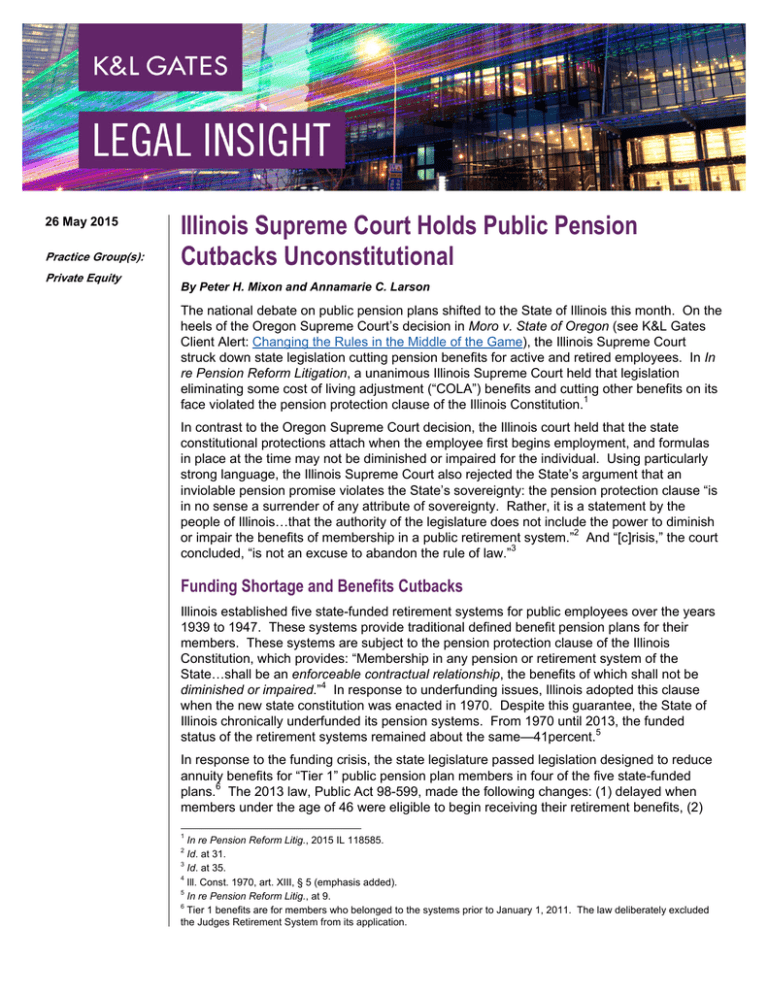
26 May 2015
Practice Group(s):
Private Equity
Illinois Supreme Court Holds Public Pension
Cutbacks Unconstitutional
By Peter H. Mixon and Annamarie C. Larson
The national debate on public pension plans shifted to the State of Illinois this month. On the
heels of the Oregon Supreme Court’s decision in Moro v. State of Oregon (see K&L Gates
Client Alert: Changing the Rules in the Middle of the Game), the Illinois Supreme Court
struck down state legislation cutting pension benefits for active and retired employees. In In
re Pension Reform Litigation, a unanimous Illinois Supreme Court held that legislation
eliminating some cost of living adjustment (“COLA”) benefits and cutting other benefits on its
face violated the pension protection clause of the Illinois Constitution.1
In contrast to the Oregon Supreme Court decision, the Illinois court held that the state
constitutional protections attach when the employee first begins employment, and formulas
in place at the time may not be diminished or impaired for the individual. Using particularly
strong language, the Illinois Supreme Court also rejected the State’s argument that an
inviolable pension promise violates the State’s sovereignty: the pension protection clause “is
in no sense a surrender of any attribute of sovereignty. Rather, it is a statement by the
people of Illinois…that the authority of the legislature does not include the power to diminish
or impair the benefits of membership in a public retirement system.”2 And “[c]risis,” the court
concluded, “is not an excuse to abandon the rule of law.”3
Funding Shortage and Benefits Cutbacks
Illinois established five state-funded retirement systems for public employees over the years
1939 to 1947. These systems provide traditional defined benefit pension plans for their
members. These systems are subject to the pension protection clause of the Illinois
Constitution, which provides: “Membership in any pension or retirement system of the
State…shall be an enforceable contractual relationship, the benefits of which shall not be
diminished or impaired.”4 In response to underfunding issues, Illinois adopted this clause
when the new state constitution was enacted in 1970. Despite this guarantee, the State of
Illinois chronically underfunded its pension systems. From 1970 until 2013, the funded
status of the retirement systems remained about the same—41percent.5
In response to the funding crisis, the state legislature passed legislation designed to reduce
annuity benefits for “Tier 1” public pension plan members in four of the five state-funded
plans.6 The 2013 law, Public Act 98-599, made the following changes: (1) delayed when
members under the age of 46 were eligible to begin receiving their retirement benefits, (2)
1
In re Pension Reform Litig., 2015 IL 118585.
Id. at 31.
3
Id. at 35.
4
Ill. Const. 1970, art. XIII, § 5 (emphasis added).
5
In re Pension Reform Litig., at 9.
6
Tier 1 benefits are for members who belonged to the systems prior to January 1, 2011. The law deliberately excluded
the Judges Retirement System from its application.
2
Illinois Supreme Court Holds Public Pension Cutbacks Unconstitutional
capped the maximum salary that could be considered when calculating the amount of a
member’s retirement annuity, (3) reduced the fixed 3 percent annual annuity COLA to a
variable and limited amount, (4) completely eliminated at least one, and up to five, annual
COLA increases, and (5) altered how the base annuity amount was determined, effectively
making members’ base pensions smaller for members of two systems.7
Court Finds Cutbacks Violate Illinois Constitution
Almost immediately after the legislation passed, current public employees and retirees filed
suit to challenge the law. Upholding the lower court decision, the Illinois Supreme Court
found the new law violated the pension protection clause of the Illinois Constitution. Pointing
to Illinois case law, the court found the benefits protected by the clause attach once an
individual first embarks upon employment: “Accordingly, once an individual begins work and
becomes a member of a public retirement system, any subsequent changes to the Pension
Code that would diminish the benefits conferred by membership in the retirement system
cannot be applied to that individual.”8 The court also noted Arizona had a similar clause in
their constitution, and the Arizona Supreme Court recently struck down legislative changes
that diminished benefit payments.9
Court Rejects Police Power Justification
The State argued that pension rights should be analyzed under a constitutional “contracts
clause” analysis. Under this analysis, the State argued, the legislature may modify or
invalidate contracts through the exercise of its police powers. The court initially noted that it
had not considered this argument in its most recent decision on the pension protection
clause. The court proceeded to reject this argument, holding that neither the legislature nor
the executive branch may disregard the provisions of the state constitution unless
justification for this departure is found within the law itself. In the court’s words, “[e]xigent
circumstances are not enough.”
The Court rejected the police powers argument on two grounds. First, the court noted that
legislation impairing contracts has only rarely been upheld under the Contracts Clause. This
is particularly true when the state seeks to impair a contract to which it is a party. Because
the state’s financial self-interest is at stake, courts do not give the deference that might
otherwise be afforded in determining whether the impairment is reasonable and necessary to
serve an important public purpose.
Second, the court reasoned that the pension protection clause is an independent source of
protection for public pension benefits. The new constitution adopted in 1970 “not only
created a new right of constitutional dimension, conferring enforceable contractual status on
the benefits of membership in public retirement systems, [it] also defined the scope of the
protection afforded such benefits.”10 Given the plain meaning and the legislative history of
the pension protection clause, the court concluded that it had no possible basis for
interpreting the clause to allow the legislature to override its protections.
Finally, the court emphasized that the pension protection clause is in no sense a surrender of
the State’s sovereign authority. “Rather, it is a statement by the people of Illinois…that the
7
Ill. Public Act 98-599; see In re Pension Reform Litig., at 12.
Di Falco v. Board of Trustees, 122 Ill. 2d 22, 26 (1988).
9
In re Pension Reform Litig., at 21 (citing Fields v. Elected Officials’ Ret. Plan, 320 P.3d 1160, 1165-68 (Ariz. 2014)).
10
Id. at 29.
8
2
Illinois Supreme Court Holds Public Pension Cutbacks Unconstitutional
authority of the legislature does not include the power to diminish or impair benefits of
membership in a public retirement system.”11 Because the sovereignty of government in this
country ultimately resides in the people, they can, within limits established by the federal
constitution, delegate, withhold, or place limitations on the powers of government “as they
choose.”12
Conclusion
This Illinois decision seemingly forecloses state legislation that impairs pension rights for
existing employees. The state legislature might consider calls to amend the state
constitution or to authorize municipal bankruptcy filings by cities and other municipalities.
Outside of Illinois, states with pension protection clauses in their constitutions may look to
this case when they encounter challenges to similar legislation.
Authors:
Peter H. Mixon
Peter.Mixon@klgates.com
+1.206.370.7802
Annamarie C. Larson
Annamarie.Larson@klgates.com
+1.206.370.8013
Anchorage Austin Beijing Berlin Boston Brisbane Brussels Charleston Charlotte Chicago Dallas Doha Dubai Fort Worth Frankfurt
Harrisburg Hong Kong Houston London Los Angeles Melbourne Miami Milan Moscow Newark New York Orange County Palo Alto Paris
Perth Pittsburgh Portland Raleigh Research Triangle Park San Francisco São Paulo Seattle Seoul Shanghai Singapore Spokane
Sydney Taipei Tokyo Warsaw Washington, D.C. Wilmington
K&L Gates comprises more than 2,000 lawyers globally who practice in fully integrated offices located on five
continents. The firm represents leading multinational corporations, growth and middle-market companies, capital
markets participants and entrepreneurs in every major industry group as well as public sector entities, educational
institutions, philanthropic organizations and individuals. For more information about K&L Gates or its locations,
practices and registrations, visit www.klgates.com.
This publication is for informational purposes and does not contain or convey legal advice. The information herein should not be used or relied upon in
regard to any particular facts or circumstances without first consulting a lawyer.
© 2015 K&L Gates LLP. All Rights Reserved.
11
12
Id. at 31.
Id. at 31 (citing Hawthorn v. People, 109 Ill 302, 306 (1883)).
3




